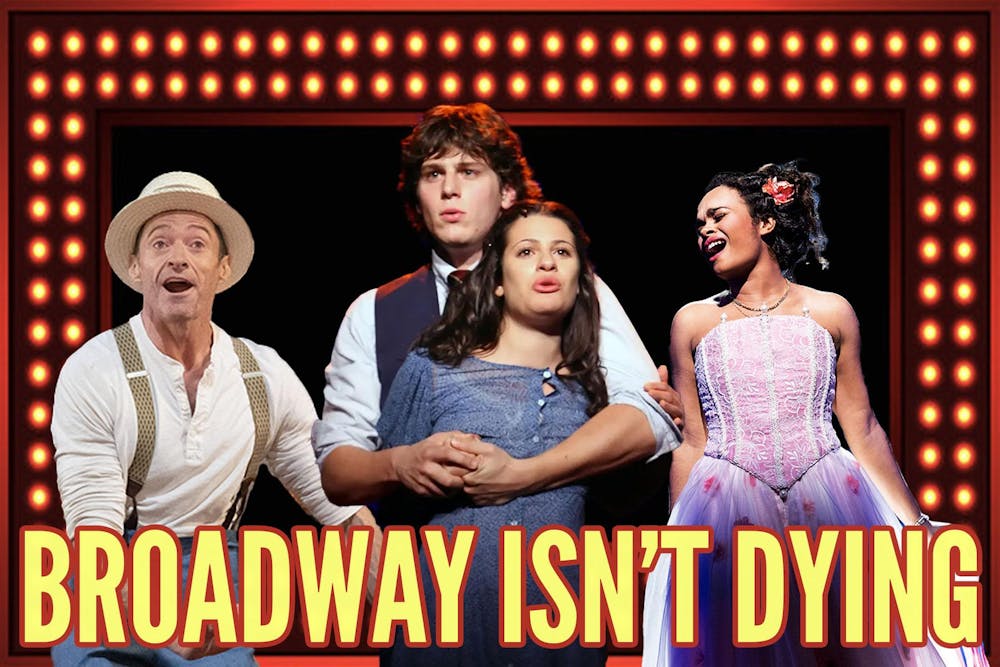Every few years, there’s a mandatory panic about the death of some industry of some sort. Streaming was meant to be the end of network television, yet “Abbott Elementary” and “Young Sheldon” are cultural touchstones to many. Siskel and Ebert suspect home video might cause the death of the cinema, but with more options for home viewing than ever, movies such as “Inside Out 2” or “Deadpool and Wolverine” still manage to surpass a billion dollars in ticket sales. Over the last few months, I’ve noticed the next industry on the hypothetical chopping block: Broadway musicals.
Nobody is saying Broadway musicals are going away; with social media and music streaming, it might be the easiest era for musicals to gain mainstream popularity, or at least the lowest bar of entry for mainstream knowledge. Rather, there seems to be a growing notion that the “culture” of Broadway is dying.
It isn’t. If you feel this way, you just might not be the target audience anymore.
Like any institution, Broadway goes through phases. Grand sweeping romances dominated in the ’50s, with classics such as “Oklahoma!” and “The Music Man.” Then, the themes and music got more complex with the rise of Sondheim and works such as “Company” or Webber’s “Jesus Christ Superstar.” In the ’90s and early ’00s, disillusionment and angst was in, which led to musicals like “Rent,” “Spring Awakening” and “Avenue Q” dominating the stages.
We’re entering a new era for Broadway, and I firmly believe that it’s for younger audiences. Surely, there remain classic shows that appeal to a wide swath of audiences, but newer productions such as the star-studded “Romeo + Juliet” and, ironically, “& Juliet” the musical, are without a doubt aimed at younger audiences than the usual Broadway fare. Musicals such as “Six” and “Ride the Cyclone” feel made for TikTok, with witty lyrics perfect for soundbites and quoting. Celebrities on Broadway have never been more normal: popular songwriters such as Sara Bareilles and Florence Welch (of Florence + the Machine) have been given chances to write shows, often to success in Bareilles’ case, or great anticipation as towards Welch’s unreleased adaptation of “The Great Gatsby.” Celebrities often appear onstage, too.
While I have personal objections to Nick Jonas appearing in Jason Robert Brown’s “The Last Five Years,” I don’t object to celebrity actors appearing in musicals in general. Charli D’Amelio, a TikToker famous for being genuinely good at dancing, is an ensemble dancer on the aforementioned “& Juliet,” while that show’s inspiration stars Rachel Zegler (“West Side Story,” “The Hunger Games: The Ballad of Songbirds and Snakes”) as Juliet and Kit Connor (“Heartstopper”) as Romeo, both to rave critical reviews and great fan response.
That fan response is what motivated me to write this article. I’ve seen criticisms online, in shocking quantities, towards the Shakespearean revival solely on the fact that audiences only want to see the show to watch the celebrities in it. Are movies not the same way? Why is Broadway so sacred that famous actors don’t get the chance to star there, too? Or is it only because they’re popular with young (read: seemingly less tasteful) audiences? Gatekeeping is the death of enthusiasm, in my opinion. If I encounter a seemingly impossible bar I need to pass to validate my enjoyment of a work, I find it’s not worth it. By gatekeeping theater because of your distaste for these popular (and based on reviews, skilled) actors being involved, and in turn gatekeeping from younger audiences interested in watching them perform, you are killing potential theater lovers before they can even grow and flourish.
Broadway isn’t dying. It’s thriving, actually. But maybe, if you’re of the opinion that it’s suffering because of the young blood being pumped in, then that’s a sign that you’re not the target audience anymore. And maybe, there’s nothing wrong with that, either. There’ll always be something for everyone in the theater. So, don’t make others feel unwelcome.










